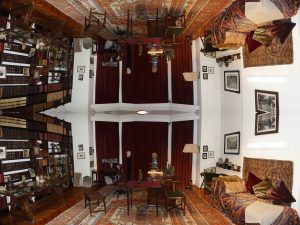Turner Prize-winning artist Mark Wallinger is working with a community campaign in north London to create a revolutionary digital art experience which anyone with £1 and upwards can afford to take part in.
ONE POTATO, TWO POTATO, a major new Wallinger work, has been created for a ground-breaking fundraising initiative by the NOcado campaign. It offers members of the public the chance to collaborate in unveiling the piece by revealing squares of the online image for as little as £1 each.
The theme, character and appearance of Wallinger’s artwork are closely guarded secrets. They will be revealed square by square, as members of the public unveil the 66,528 parts of its surface in an order devised by the artist. Each participant will receive a high-res image of the piece once all squares have been revealed. 46 signed posters will be scattered through the work to be allocated to participants via a draw.

COMMUNITY STRUGGLE
Proceeds from the work will go to the NOcado campaign, which has made national news with its two-year – and ongoing – battle to stop Ocado and M&S opening a 24/7 delivery depot beside a primary school and densely populated housing. The online retailers have abused planning loopholes to attempt to gain use of the Bush Industrial Estate in London N19.
The number of prize posters references the 465 children at Yerbury Primary School, who will be exposed to damaging and disruptive air, noise and light pollution if this Ocado/M&S depot goes ahead. Residents in the neighbouring flats will be exposed to these ills 24/7.
The struggle is now reaching a critical stage. Following a lengthy battle with the community, Ocado are mounting a third attempt to gain use of the site via planning loopholes. They are also appealing to the Planning Inspectorate to reverse Islington Council’s rejection of their second application, involving the NOcado campaign in substantial legal costs – making the need for this fundraising initiative all the more urgent.
MARK WALLINGER
Mark Wallinger, whose studio is in nearby Archway, has been involved in social and political activism since the start of his career. State Britain, his 2007 Turner Prize-winning installation, comprised a recreation of an anti-Iraq War protest in Tate Britain. He created the first artwork for Trafalgar Square’s empty Fourth Plinth and the Labyrinth series of plaques for London Underground.
Mark Wallinger said:
I spend over half my time in the area, so I feel like a local and for me the issues are clear-cut. During the Pandemic, many were reliant on home deliveries, but now we’re coming out of that we’re looking at the destruction this has wreaked on the High Street and therefore on the community.
Wallinger described his response to the challenge of creating an entirely online work for this important cause as “gently satiric”.
Seeing the children playing in such close proximity to the proposed depot, I was struck by how timeless their play is. The setting is very modern, the position of the site is extremely serious, but add a hula hoop or a football or a hopscotch pattern – which the children were playing when I was there – and you have a scene that could be age old. To this I’ve added a counter image of a land of ease where the normal rules of work don’t apply, inhabited by larger beings who are intoxicated by their own greed.
Natasha Cox, NOcado campaigner, said:
Art and creativity are a vital part of our children’s education, so it’s exciting that a great work of art can help us protect the children of Yerbury and fight the well-resourced Ocado and M&S.
THE NOCADO CAMPAIGN
The NOcado campaign was created by Yerbury School parents and local residents in December 2019, when it was revealed that Ocado had been granted a licence to operate a depot in this densely populated area. The depot had no restrictions on operating hours and potentially grave consequences for the surrounding community from toxic diesel emissions, noise and light pollution, traffic congestion and threats to local businesses.
Having persuaded the local council, London Borough of Islington, to revoke Ocado’s licence to operate the site – because of misleading evidence in the company’s original application – NOcado gained national news coverage when it won a High Court battle preventing Ocado from overturning the Council’s decision. NOcado, which enjoys strong community support, has since fought off a second attempt by Ocado to get use of the site by abusing planning loopholes. Obtaining a licence via a CLEUD (Certificate of Lawful Existing Use or Development) would allow Ocado to avoid the scrutiny and restrictions involved in a full planning application.
NOcado is expanding its efforts to a national level with the imminent publication of an independent research report looking at ways to modify Britain’s planning laws to remove loopholes that allow companies to site their operations close to schools, hospitals, care homes or existing housing.
Funds raised by the online art project will go towards paying the NOcado campaign’s ongoing and considerable legal costs.







